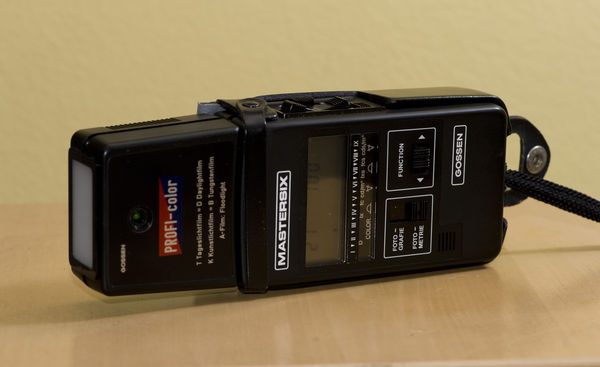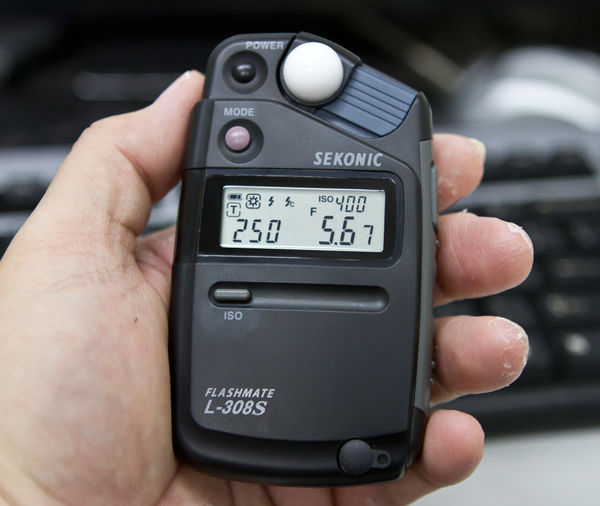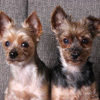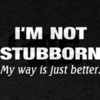Light meters... How many other here still use them?
Feb 18, 2013 07:06:40 #
Always carry my Luna Pro and if shooting conditions allow I read the scene with and without the 7.5 /15* attachment and log observations into my Field Log... My early version of Meta Data plus comments. Still helpful in post p.
Feb 18, 2013 07:22:28 #
I do not rely on camera meters at all. I use the Sekonic L-358 for all around measurements as well as the rarely seen Gossen Profi-Color (see photo below) for accurate color temperature and white balance settings for critical work.

Feb 18, 2013 07:26:40 #
Who uses a light meter? It was predictable that most people responding would be people who DO use a meter. To redress the balance, let me say I don't. Wouldn't even know how to use one (although I expect they come with a manual). I'd consider using one (if I could work out how) for hobby stuff, but when I'm working I'm usually on a minesite, shooting from the hip (not literally!) as equipment-in-action opportunities present themselves, and the last thing I'd need would be an extra piece of equipment to worry about. (I don't even use a tripod, because it's just not practical in those circumstances - I rely on firm wrists and a high shutter speed, back by relatively high ISO (say 400 on a sunny day)
That's my statement - now here's my question: If I had a meter and learned how to use it, can any of the many pros out there tell me roughly - in percentage terms - how much better I could expect my shots to be?
Second question: As camera technology improves, will meters still be widely used in, say, five years from now?
Third question: Hasn't digital PP to a large extent removed the need for metering? What I'm saying is the camera will largely get it right, and Camera Raw (or whatever) will help you to fine-tune.
Now, just to cover my bets, let me ask that anyone who responds excludes studio work, which I appreciate is a very different animal from outdoor work like mine, or landscapes, BIF, grandchildren, outdoor sports etc.
Sorry, I'm rambling (second glass of red), but I think what I'm saying is there's clearly a place for metering but I think it really applies to specialist areas, not the general run of photography.
Now, that should kick something off....
That's my statement - now here's my question: If I had a meter and learned how to use it, can any of the many pros out there tell me roughly - in percentage terms - how much better I could expect my shots to be?
Second question: As camera technology improves, will meters still be widely used in, say, five years from now?
Third question: Hasn't digital PP to a large extent removed the need for metering? What I'm saying is the camera will largely get it right, and Camera Raw (or whatever) will help you to fine-tune.
Now, just to cover my bets, let me ask that anyone who responds excludes studio work, which I appreciate is a very different animal from outdoor work like mine, or landscapes, BIF, grandchildren, outdoor sports etc.
Sorry, I'm rambling (second glass of red), but I think what I'm saying is there's clearly a place for metering but I think it really applies to specialist areas, not the general run of photography.
Now, that should kick something off....
Feb 18, 2013 07:40:57 #
jimward wrote:
...
That's my statement - now here's my question: If I had a meter and learned how to use it, can any of the many pros out there tell me roughly - in percentage terms - how much better I could expect my shots to be?
That's my statement - now here's my question: If I had a meter and learned how to use it, can any of the many pros out there tell me roughly - in percentage terms - how much better I could expect my shots to be?
Not sure...never saw your shots or how many you waste just "winging it..."
But just so you know, once you meter, you don't have to keep "re-metering" unless the available light changes, i.e. you go into the shade, or you walk out into the sun...it makes no difference what direction your camera is pointing and how wildly your camera's meter is swinging...it only matters how the light has changed...if at all.
Quote:
Second question: As camera technology improves, will meters still be widely used in, say, five years from now?
Second question: As camera technology improves, will meters still be widely used in, say, five years from now?
who can say? So far, they are still necessary, just count the amount of "why is my snow grey?" or "how come my shots turned out underexposed" amount of threads here in a month... :)
Quote:
Third question: Hasn't digital PP to a large extent removed the need for metering? What I'm saying is the camera will largely get it right, and Camera Raw (or whatever) will help you to fine-tune.
Now, just to cover my bets, let me ask that anyone who responds excludes studio work, which I appreciate is a very different animal from outdoor work like mine, or landscapes, BIF, grandchildren, outdoor sports etc..
Third question: Hasn't digital PP to a large extent removed the need for metering? What I'm saying is the camera will largely get it right, and Camera Raw (or whatever) will help you to fine-tune.
Now, just to cover my bets, let me ask that anyone who responds excludes studio work, which I appreciate is a very different animal from outdoor work like mine, or landscapes, BIF, grandchildren, outdoor sports etc..
In my mind..it hasn't. All it's done is to give the "impression" that nobody needs a meter...but I've seen enough hundreds or thousands of badly exposed shots and questions about what went wrong here on the 'hog to know differently.
I use mine all of the time...and here is one good reason.
This weekend I shot some wrestling indoors at a Gym.
The normal "camera meter" way to do it would be to set it on auto and let it decide how to expose. The meter would swing from right to left depending on what you pointed at...you'd be getting the "impression" that the exposure was changing quickly...when it really isn't.
I did this:
Enter the gym.
Meter the light at the mat.
Set the camera.
Shoot for the next several hours without changing anything at all....disregard the camera's meter.
Now which sounds easier? :)
And yes...I've heard all of the reasons why a meter isn't practical..."the conditions change so fast I don't have time!!"
Or...
"It's one more thing I have to carry!"
But to me? None of those reasons are very good (or even valid many times)...they are just excuses of those who've never used one and doesn't see why they'd need one.
I was that way until I got one...now I know.
Feb 18, 2013 08:11:16 #
I have used and still use light meters (starting with an old Weston than Minolta, and for the pass 10 years a Sekonic). Currently use Sekonic L-478DR and although my D800e's meters are very good, the light meter is an excellent tool to have.
If anything, it teaches you to look at the light and understand what exposure is. I bet most photographers do not know what the Sunny f/16 rule is or how to apply it.
Most of the time the camera's meter does a good job, but it is a reflective meter trying it's best to make everything 18% grey. A light meter is an incident meter, so it reads light falling on the subject and not reflected by the object.
There is no substitute for getting exposure correct in your camera, though you can correct a lot in post, you still are losing information by not getting it right to begin with.
I used mine yesterday for an outside engagement shoot. As well as setting up my flashes when we moved indoors....though Nikon's CLS system is very good, at times, I like to take full control of the strobes and nail down my lights to what I want.
If anything, it teaches you to look at the light and understand what exposure is. I bet most photographers do not know what the Sunny f/16 rule is or how to apply it.
Most of the time the camera's meter does a good job, but it is a reflective meter trying it's best to make everything 18% grey. A light meter is an incident meter, so it reads light falling on the subject and not reflected by the object.
There is no substitute for getting exposure correct in your camera, though you can correct a lot in post, you still are losing information by not getting it right to begin with.
I used mine yesterday for an outside engagement shoot. As well as setting up my flashes when we moved indoors....though Nikon's CLS system is very good, at times, I like to take full control of the strobes and nail down my lights to what I want.
Feb 18, 2013 08:22:59 #
I use an older Sekonic L-508 Zoom Master Some time in difficult lighting. Works pretty well.
Feb 18, 2013 08:23:00 #
I use a light meter for indoor lighting under very controlled lighting such as when using strobes or off camera flash. I do not use it anymore other wise.
Feb 18, 2013 08:31:16 #
I use mine in every situation i can....just like the american express, i don't leave home without it.
mine is a very inexpensive one and works great every time. I use the sekonic L308S. gonna buy the L358 soon.
I have a real good friend of mine that is anti-light meter....mostly because he doesn't have one caus his wife won't let him buy one.
mine is a very inexpensive one and works great every time. I use the sekonic L308S. gonna buy the L358 soon.
I have a real good friend of mine that is anti-light meter....mostly because he doesn't have one caus his wife won't let him buy one.

Feb 18, 2013 08:35:33 #
Being new to photography, I wouldn't even know how to use a light meter. Wouldn't mind learning though. I'm always up for learning something new.
Feb 18, 2013 08:42:06 #
js15063 wrote:
Being new to photography, I wouldn't even know how to use a light meter. Wouldn't mind learning though. I'm always up for learning something new.
very simple...set your iso and shutter speed.....the meter will let you know the proper f stop.
Feb 18, 2013 08:50:33 #
jimberton wrote:
very simple...set your iso and shutter speed.....the meter will let you know the proper f stop.
js15063 wrote:
Being new to photography, I wouldn't even know how to use a light meter. Wouldn't mind learning though. I'm always up for learning something new.
very simple...set your iso and shutter speed.....the meter will let you know the proper f stop.
Just to make sure this sunk in to newbies....using a light meter is beneficial in many ways...it TEACHES you how to set your camera in manual mode...you don't have to think...but in doing so...you begin to see what settings work...
You can set it up and then play "what if"...till the cows come home by just spinning the dial...."what if the ISO was higher?" What if the shutter speed doubled?" etc....
Feb 18, 2013 09:02:26 #
I still use my minolta III meter which a automobile tire rolled on it at a wedding in 02 it was purchased in1990 and I use it for reference daily.
Feb 18, 2013 09:04:09 #
My main camera does not have a meter, so yes. I have an Sekonic incident meter I use for street work and a Pentax spot meter I use for slower more intensive work.
Feb 18, 2013 09:10:53 #
i use my old Gossen Lunasix, mostly when i do MF 6x6 B&W film-that's quite often,and that's the way i like working,knowing and controlling what i'm doing.
Feb 18, 2013 09:14:00 #
jimward wrote:
Third question: Hasn't digital PP to a large extent removed the need for metering? What I'm saying is the camera will largely get it right, and Camera Raw (or whatever) will help you to fine-tune.
Third question: Hasn't digital PP to a large extent removed the need for metering? What I'm saying is the camera will largely get it right, and Camera Raw (or whatever) will help you to fine-tune.
No. PP cannot recover information that was not there to begin with. If the highlights are blown, the detail is gone. This is not to say that you cannot drop a sky in from another photo. Essentially, this is what you are doing with HDR-- taking the information from several photos and combining into a single image the best detail from the highlights and the best detail from the shadows.
If you want to reply, then register here. Registration is free and your account is created instantly, so you can post right away.











